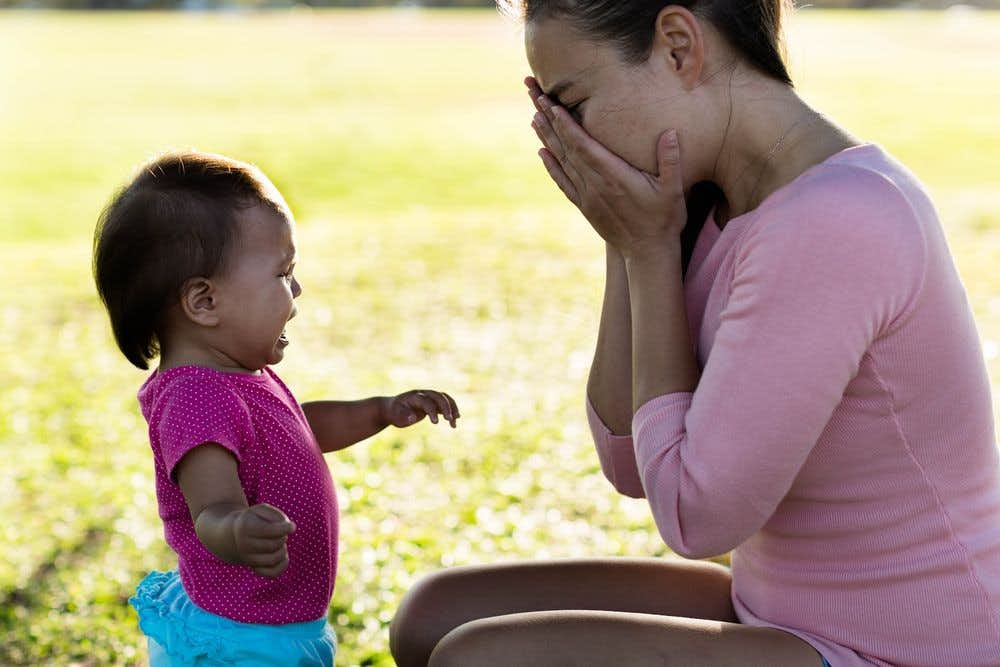“The very damaging, frightening part of postpartum is the lack of perspective and the lack of priority and understanding what is really important.” – Brooke Shields
Postpartum Depression in New Moms
Most of the time, successfully conceiving and expecting an addition to the family is an exciting time. Bringing a brand new life into this world is a true miracle. However, sometimes having a baby is not necessarily all that it's hyped up to be. There can be worries and fears associated with caring for a newborn as well as the sudden changes to your daily life.
Oftentimes, these worries and fears for new mothers can trump the anticipated joys. Ultimately, if these anxieties are not managed they can manifest into something more serious, postpartum depression (PPD).
What is Postpartum Depression?
Postpartum depression is a type of depression that can develop after childbirth. It may appear soon after delivery or up to a year later. While the duration and severity can vary, symptoms might last from a few days to several weeks.
In more severe cases, the effects can be longer-lasting. The intensity of postpartum depression symptoms also varies; some women may experience mild signs of postpartum depression, whereas others may encounter more severe symptoms.
Postpartum Depression Symptoms
Given its name, postpartum depression shares similar signs and symptoms to general depression. The types, amounts, and severity of the signs and symptoms a woman experiences is different for every individual. Some of the common signs and symptoms of postpartum depression include:
Emotional Changes:
- Persistent sadness or low mood
- Frequent crying spells, often without a clear reason
- Sudden mood swings
- Feelings of hopelessness or worthlessness
- Overwhelming anxiety or panic attacks
- Irritability or anger toward oneself, others, or the baby
- Feelings of guilt, especially regarding motherhood
- Fear of not regaining one’s pre-pregnancy life
Physical Changes:
- Chronic fatigue or extreme tiredness
- Insomnia or excessive sleeping
- Changes in appetite, either undereating or overeating
- Nausea and hot flashes
Behavioral Changes:
- Loss of interest in activities that used to be enjoyable
- Difficulty bonding with the baby or lack of interest in the baby
- Social withdrawal from friends and family
- Struggling to perform daily tasks and responsibilities
Severe Symptoms:
- Thoughts of harming oneself or the baby
- Inability to care for oneself or the baby
Postpartum Mood Disorders
Postpartum depression has become a silenced topic among women. Regardless of severity, onset, and longevity, women feel shameful to admit to these feelings and emotions of guilt, shame, hopelessness, and sadness. However postpartum depression is so common that there are now specific types of mood disorders that fall within postpartum. According to the American Pregnancy Association these categories are:
Baby Blues
- About 50-75% of new mothers have general negative feelings, also known as the “baby blues”, shortly after childbirth
- The most common type of negative emotional state after having a baby
- The least severe
- Almost always go away on its own
Postpartum Depression
- About 15% of new mothers experience symptoms of postpartum depression
- Typically needs treatment to resolve itself
Postpartum Anxiety
- Approximately 10% of women who who give birth suffer postpartum anxiety
- Postpartum anxiety can be coupled with depression and/or panic attacks
Postpartum Obsessive-Compulsive Disorder (OCD)
- About 3-5% of mothers show signs of postpartum OCD
- Women with postpartum obsessive compulsive disorder manifest their negative emotions through repetitive and obsessive actions
What Causes Postpartum Depression?
There are a variety of reasons why women suffer from negative emotions after having a child. Whether this is their first or fifth baby, the reasons for postpartum depression can vary. Some common causes of postpartum depression are:
- Hormonal Changes: According to the Mayo Clinic, the sharp decline in estrogen and progesterone levels after childbirth can trigger postpartum depression. Additionally, a significant drop in thyroid hormones may contribute, leaving new mothers feeling tired, sluggish, and depressed.
- Sleep Deprivation: The lack of adequate rest can exacerbate feelings of depression as new parents adjust to the sleeping schedule of a newborn.
- Overwhelming New Responsibilities: The demands of caring for a newborn alone or alongside other children can overwhelm many new mothers.
- Work-Life Balance: The challenge of balancing professional responsibilities and family life adds significant stress.
- Breastfeeding Challenges: The pressures of breastfeeding and pumping can contribute to feelings of inadequacy and anxiety.
- Decision Fatigue: New parents often face a barrage of decisions regarding their baby's care, such as medical choices, choosing between breastfeeding and formula feeding, or deciding on co-sleeping versus sleep training.

Can Postpartum Depression Be Prevented?
While it's not always possible to completely prevent postpartum depression (PPD), there are strategies that can reduce the risk and help manage symptoms if they do occur. Here's how expectant and new mothers can proactively address the factors that contribute to postpartum depression:
- Prenatal Education: Understanding the signs of postpartum depression before the baby arrives can help mothers and their support systems recognize the symptoms early. Educational programs about what to expect emotionally after childbirth can be beneficial.
- Health Assessments: Regular health check-ups during and after pregnancy can help monitor the physical and emotional wellbeing of the mother. These visits are opportunities to discuss any distressing feelings or anxiety with healthcare providers.
- Strong Support Networks: Building a strong support network of family, friends, and professionals can provide the emotional and practical support needed during the transition to motherhood. Having someone to share tasks with or talk about feelings can significantly alleviate stress.
- Self-care: Encouraging mothers to prioritize their own well-being is crucial. This includes adequate rest, nutrition, exercise, and time for personal activities that promote relaxation and happiness.
- Early Intervention Programs: Participating in programs designed for new parents that focus on mental health can provide tools and resources to manage stress and cope with the changes that come with parenting.
- Therapeutic Support: Engaging with a therapist or counselor during the prenatal and postpartum periods can help manage stress and mitigate the effects of mood swings. Cognitive-behavioral therapy (CBT) and other therapeutic approaches have been shown to be effective in preventing and treating PPD.
Do I Have Postpartum Depression?
If you're wondering whether you might have postpartum depression (PPD), it's important to recognize the symptoms and seek professional help if needed. Postpartum depression can manifest differently in everyone. Book a consultation with one of our leading depression therapists if you notice any of the following symptoms:
- Persistent Sadness or Low Mood: Feeling down, hopeless, or miserable most of the time and unable to shake these feelings.
- Loss of Interest: No longer finding pleasure in activities you used to enjoy.
- Changes in Appetite: Eating significantly more or less than usual.
- Sleep Disturbances: Struggling with insomnia despite feeling exhausted, or oversleeping.
- Irritability or Anger: Feeling unusually irritable, angry, or frustrated over small matters.
- Anxiety: Experiencing intense or overwhelming feelings of worry or fear.
- Feelings of Worthlessness or Guilt: Harboring negative thoughts about yourself or feeling excessively guilty.
- Difficulty Bonding with the Baby: Struggling to connect with your newborn or feeling indifferent.
- Withdrawal from Social Contacts: Pulling away from friends and family and isolating yourself.
- Thoughts of Harm: Having thoughts of harming yourself or your baby (urgent medical help should be sought immediately if this occurs).
How to Treat Postpartum Depression?
Whether you are suffering from a mild case of the “baby blues” or a dangerously prolonged and serious case of postpartum depression it is important to seek help. Finding healthy and effective ways to deal with the challenges of negative thoughts and emotions as a mother is crucial to the well-being of not just yourself, but those around you, including the baby, your spouse, and any other children.
If you or someone you know may be suffering from postpartum depression try some of the following guidelines for healing:
Consult Healthcare Professionals: Speak with your doctor or midwife about your symptoms. They can provide initial guidance and refer you to appropriate specialists.
- Professional Therapy: Engage with a therapist who specializes in postpartum mental health. Talk therapy can be incredibly effective in managing symptoms.
- Medication: If advised by your healthcare provider, medication can help correct chemical imbalances and alleviate some symptoms of depression.
- Support Networks: Lean on friends and family for practical help with errands and child care, and emotional support.
- Join a Support Group: Connect with other mothers experiencing similar challenges. Sharing experiences can provide comfort and insights into managing symptoms.
- Communication with Your Partner: Keep the lines of communication open with your partner. Sharing feelings and asking for support can strengthen your relationship and provide additional relief.
- Self-Care: Make time for activities that bring you joy and relaxation, whether it’s reading, watching a favorite show, or enjoying a hobby.
- Physical Activity: Incorporate exercise into your routine. Physical activity can boost mood and improve mental health.
- Mindfulness and Relaxation: Try mindfulness practices such as meditation or journaling to manage stress and thoughts. Relaxing activities like taking a hot bath can also be soothing.
- Indulge in Pleasures: Treat yourself occasionally to your favorite food or a small luxury. It’s important to feel pampered and cared for.
How To Help Someone With Postpartum Depression?
Supporting someone with postpartum depression (PPD) can be challenging, but your involvement can make a significant difference in their recovery. Here’s how you can help:
- Listen Without Judgment: Be a supportive listener. Allow them to share their feelings without offering advice or judgment. Sometimes, simply being there and listening is the most effective support you can offer.
- Encourage Professional Help: Gently encourage them to seek professional help. Offer to help find a perinatal therapist, make phone calls, or even accompany them to appointments if they're comfortable with it.
- Help with Daily Tasks: Assist with daily chores and responsibilities, which can seem overwhelming to someone with PPD. Offer to help with household tasks, cooking, or caring for the baby to give them some respite.
- Provide Emotional Support: Be patient and understanding. Recognize that recovery from PPD takes time, and emotional ups and downs are part of the process. Your steady support can be a crucial anchor.
- Educate Yourself: Learn about PPD so you can understand what your loved one is experiencing. This knowledge can help you provide better support and keep your expectations realistic.
- Encourage Social Interaction: Help them maintain social contacts and gently encourage them to engage in social activities, even if it’s just a short walk or a visit to a coffee shop.
- Watch for Signs of Improvement or Worsening: Be observant of their progress and any signs of worsening symptoms. If their condition seems to be deteriorating, encourage them to discuss it with their healthcare provider.
- Take Care of Yourself: Supporting someone with depression can be draining. Make sure to look after your own mental and physical health, and seek support if needed.
Leading Mental Health Services For Postpartum Depression In Chicago
Discover unparalleled support at Clarity Clinic, Chicago’s premier mental health clinic, specializing in postpartum depression and a comprehensive range of mental health issues. Our clinic stands out as the leader in delivering empathetic, expert care with a team of dedicated psychiatrists, psychologists, and therapists who understand the challenges of postpartum depression.
Whether you're seeking therapy, counseling, or specialized treatment plans, we provide a nurturing environment designed to guide you toward recovery and well-being.
Don't navigate this journey alone. Connect with us today to schedule your consultation with a mental health therapist near you in one of our clinic locations (Loop, River North, Arlington Heights, Evanston, Lakeview Belmont, Lakeview Broadway, Mokena).
Whether you are dealing with postpartum depression, OCD, or anxiety, take the first step towards reclaiming your health and happiness. Join countless others in who have found solace and success in our care. Contact us now to learn more about our depression treatment services and how we can help you thrive.
Related Readings:
- Maternal Mental Health: Motherhood & Self-Discovery
- Pregnancy & Mental Fatigue
Book a Consultation! Your Questions Answered: Postpartum Depression
What is postpartum anxiety?
Postpartum anxiety is intense worry or fear that occurs after childbirth, which can affect a mother's ability to function and care for her baby and herself.
What is postpartum obsessive-compulsive disorder?
Postpartum obsessive-compulsive disorder (OCD) involves intrusive, unwanted thoughts and repetitive behaviors aimed at reducing anxiety, specifically related to newborn care.
What is OCD?
Obsessive-Compulsive Disorder (OCD) is a mental health condition characterized by persistent, unwanted thoughts (obsessions) and repetitive behaviors or mental acts (compulsions) that the person feels driven to perform.
What is baby blues?
Up to 75% of new mothers experience the "baby blues," a mild, transient form of distress that follows childbirth. This condition represents the most common emotional struggle during the postpartum period and is considered the least severe.
How long does postpartum depression last?
Postpartum depression typically lasts for several months, but without treatment, it can extend longer. Most women start seeing improvement within a few months with proper treatment.
When does postpartum depression start?
Postpartum depression can start anytime within the first year after childbirth, but it most commonly begins within the first three months post-delivery.
How common is postpartum depression?
Postpartum depression affects about 1 in 7 women, making it a relatively common condition following childbirth.
Can men get postpartum depression?
Yes, men can also experience postpartum depression, although it is less common. Symptoms are similar to those in women, including sadness, fatigue, and irritability.




